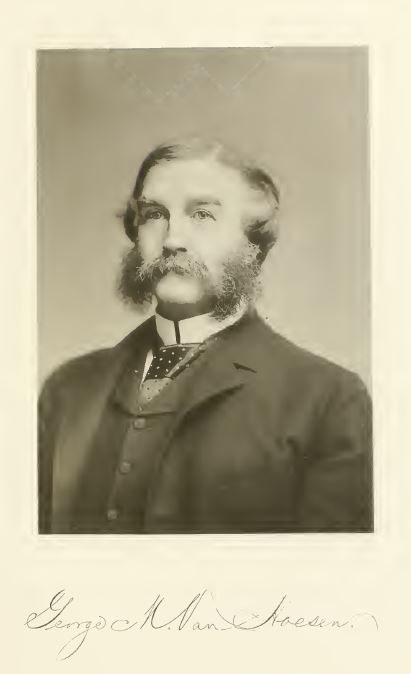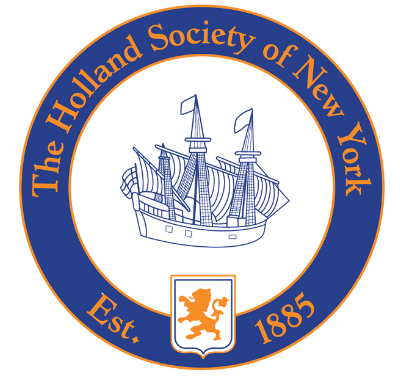By Judge George M. Van Hoersen
Year Book, 1887-88
GEORGE WEST VAN SICLEN was the first to propose the formation, and the most active in promoting the organization, of The Holland Society. In the year 1880, Mr. Van Siclen appeared as counsel for one party, and Mr. Lucas L. Van Allen, as counsel for the other party, in a series of litigations, one branch of which was in the Supreme Court, while another branch was in the Court of Common Pleas for the City and County of New York. In the Supreme Court
 Mr. Aaron J. Vanderpoel was called in as associate counsel with Mr. Van Siclen, the hearing came on before Judge Hooper C. Van Vorst, an able and a just judge. In the Court of Common Pleas the hearing was before another judge of Batavian descent. The conjunction of Dutch lawyers and Dutch judges suggested to Mr. Van Siclen the thought that the cataclysm of immigration had not entirely submerged the founders of the State, and that an union of the descendants of the pioneers who first raised the flag of The Netherlands over the waters of the Hudson would bring with it pleasure of friendly intercourse among people who had to bind them together the sentiment engendered by a common pride in their origin, and might be made the means of augmenting the wholesome influence that the integrity, the wisdom, the tolerance, the industry, and the thrift of the Dutch have never ceased to exercise upon the policy of the State. It was by no means certain, however, that the descendants of a people who had lost their ancient language, that men who had no grievance that united them against a common foe, who had become bone of the bone, and flesh of the flesh, of a nation they fondly loved, who were contented with the past, proud of the present, and confident of the future, who were in their own land, and not sojourners in a strange place, could be so moved by a mere sentiment as to lead them to form and maintain a society in memory of their* forefathers — whom momentous events rather than the efflux of time had sent to the shade which envelops the remote ancestors of every people.
Mr. Aaron J. Vanderpoel was called in as associate counsel with Mr. Van Siclen, the hearing came on before Judge Hooper C. Van Vorst, an able and a just judge. In the Court of Common Pleas the hearing was before another judge of Batavian descent. The conjunction of Dutch lawyers and Dutch judges suggested to Mr. Van Siclen the thought that the cataclysm of immigration had not entirely submerged the founders of the State, and that an union of the descendants of the pioneers who first raised the flag of The Netherlands over the waters of the Hudson would bring with it pleasure of friendly intercourse among people who had to bind them together the sentiment engendered by a common pride in their origin, and might be made the means of augmenting the wholesome influence that the integrity, the wisdom, the tolerance, the industry, and the thrift of the Dutch have never ceased to exercise upon the policy of the State. It was by no means certain, however, that the descendants of a people who had lost their ancient language, that men who had no grievance that united them against a common foe, who had become bone of the bone, and flesh of the flesh, of a nation they fondly loved, who were contented with the past, proud of the present, and confident of the future, who were in their own land, and not sojourners in a strange place, could be so moved by a mere sentiment as to lead them to form and maintain a society in memory of their* forefathers — whom momentous events rather than the efflux of time had sent to the shade which envelops the remote ancestors of every people.
Several of the Holland Society Founding Fathers
Desirous to know whether the views he entertained were shared by others, Mr. Van Siclen invited Messieurs Van Vorst, Aaron J. Vanderpoel, Lucas L. Van Allen, George W. Van Slyck and George M. Van Hoesen to meet him at his house and confer as to the feasibility of forming an association of the descendants of the early Dutch settlers of New Netherland. The gentlemen just named met at the house of Mr. Van Siclen on the 21st day of February, 1885, and determined to make an effort to establish a society, every member of which should be descended in the direct male line from a Dutchman of New Netherland. A temporary organization was formed by choosing Judge Van Vorst as Provisional President, and Mr. Van Siclen as Provisional Secretary, and it was resolved to invite a number of gentlemen whose patronymics gave proof of their eligibility to membership to the next meeting, which was held at the house of Mr. Aaron J. Vanderpoel, March 21,1885. At that meeting the following named gentlemen were present : Messieurs Hooper C. Van Vorst, George W. Van Siclen, Lucas L. Van Allen, Eobert Van Boskerck, S. O. Vanderpoel, M. D., Aaron J. Vanderpoel, A. B. Van Dusen, F. F. Vanderveer, George M. Van Hoesen, David Van Nostrand, John E. Van Nostrand, Gilbert S. Van Pelt, Richard Van Santvoord, M. D., Abraham Van Santvoord, Cornelius Van Santvoord, Robert B. Van Vleck, George Van Wageuen, and Edgar B. Van Winkle.
Letters of approval and regret of absence were also received from the following gentlemen : Messieurs William Van Alstyne, Cornelius Vanderbilt, Henry S. Van Duzer, Henry J. Van Dyke, Jr., D. D., Henry H. Van Dyck, Henry D. Van Orden, James J. Van Rensselaer, Kiliaen Van Rensselaer, Henry Van Schaick, Philip Van Volkenburgh, William Van Wyck, Henry S. Van Buran, Thomas S. Van Volkenburgh, Cornelius Van Brunt, Charles R. Van Hoesen, A. V. W. Van Vechten, and Alfred Van Santvoord.
To the gratification of all, it was found that the changes that had been wrought by the mighty movements of two centuries, though they had turned the Dutch colonist into the most patriotic of Americans, had left untouched in him the affection for Holland, the pride in the achievements of her heroic age, and the sympathy with the principles at stake in her glorious struggle for civil and religious liberty which were prominent characteristics of the Dutch settlers of New Netherland. The proposition to form a society was warmly welcomed, and steps were immediately taken to perfect the organization.
Various names were proposed for the Society, but ” The Holland Society ” was chosen because it was simple, and it required no explanation to demonstrate its appositeness.
As it was the design of its founders that the Society should be representative of the men who lived in New Netherland under the dominion of the Dutch, it was resolved not to admit to membership the descendants of those who came to New- York subsequently to 1675, the time at which the ascendency of the English was finally established ; and as it is a familiar fact that men usually look to the paternal side in determining to what stock they are to ascribe their origin, it seemed proper to admit no one who cannot prove his descent in the direct male line from a man who, acknowledging allegiance to Holland, was settled in New Netherland.
The desire to prove eligibility to membership has stimulated researches into family history that would never have been made if the Society had not been formed; and in establishing his right to belong to The Holland Society, a member proves that from the very dawn of our country’s existence his fathers have tended the tree beneath whose branches sixty millions of Americans repose; and his heart swells with pardonable pride in his origin as he recalls the truth that America derives from Holland, the land of his ancestors, the three ideas that have made the United States the most happy and the most prosperous of nations: liberty of conscience, for with the Dutch it was not necessary to be a member of a particular church in order to possess the right of self-government; the free-school system, which qitalifies man for liberty regulated by law; and lastly the duty as well as the expediency of giving a warm welcome to the exile and the stranger. To these ideas, and not to the boasted energy and enterprise of the people of any locality, is the wonderful growth of the country to be attributed, and those who know that the world is governed by ideas perceive the masterful influence of the Dutch upon every epoch of our national life. As the mind turns from the present greatness of the State of New York to the humble beginning of the Colony of New Netherland, how striking is the significance of the motto of our Society, “Eindelijk wordt een spruit eeu boom.”

